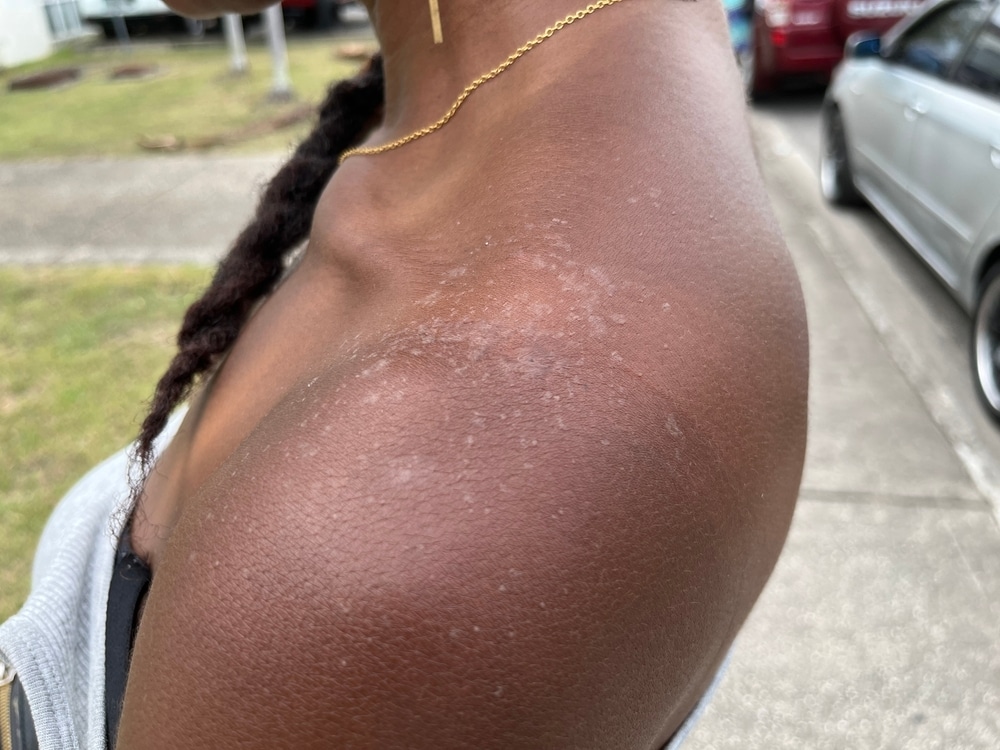With summer around the corner, you may already be daydreaming about the beach, picnics, and other fun in the sun. What may not be at the top of your mind, however, is sunscreen—especially if you have darker skin. After all, sunburn on dark skin isn't a thing . . . is it?
While melanated skin may have more natural protection from the sun than fairer skin, it's not immune to ultraviolet (UV) rays' harmful effects. The truth is that people with darker skin tones still experience sun damage, including hyperpigmentation, age spots, and yes—even sunburn.
Read on for a deep dive into sunburn on dark skin, including how to spot it, what to do about it, and how to prevent it.
Understanding Sunburn on Dark Skin
To understand how sunburn works, it helps to know about melanin, the pigment that gives your skin its color.
All skin has melanin. The more melanin you have, the darker your skin. Melanin offers some natural protection against the sun by absorbing and scattering UV rays before they can damage your skin cells. But the protection isn't that high. Generally speaking, Black skin has the equivalent of roughly SPF 13, which is far less than the minimum SPF 30 most Dermatologists recommend. Without sunscreen, all shades of skin—including darker skin—can burn.
Signs of Sunburn on Dark Skin
Sunburn on darker skin may not be as obvious as on its fairer counterparts. Rather than redness, sunburn may appear a subtle violet or brown color. In some cases, you may not see any noticeable color change at all. Other sunburn symptoms on Black and brown skin can include:
- Warmth
- Pain or tenderness
- Itchy or tight skin
- Dry, cracked skin
- Swelling
- Peeling
With a more severe sunburn, you may develop fluid-filled blisters, severe pain, tiredness, and even fever. Contact your doctor if you experience any of these symptoms.
Treating Sunburn on Dark Skin
If you find yourself with sunburned skin, don't panic. Focus on healing.
Cool Your Skin
First, apply a cool compress to the area or take a cool bath. This will decrease blood flow to the area and lower inflammation.
Moisturize
Keep your skin hydrated but avoid thick oils or emollients, which can trap heat and make the situation worse. Moisturizing creams with Aloe Vera can help reduce inflammation and provide immediate relief. Apply every few hours to prevent your skin from drying out. If your skin peels, avoid picking at it. Just focus on keeping the area moisturized.
Hydrate
Hydrate from the inside out by consistently drinking water or non-sugary drinks throughout the day.
Relieve Discomfort
As long as you have the green light from your doctor, over-the-counter pain relief (like ibuprofen) can help calm inflamed skin and relieve discomfort.
Protecting the Skin You're In
When it comes to the sun, it's all about prevention. Sun protection doesn't just help prevent sunburn—it also prevents other unwanted signs of UV damage, like sunspots, uneven skin tone, and hyperpigmentation.
Mild sunburn in darker skin doesn't usually cause post-inflammatory hyperpigmentation. However, sun exposure can worsen hyperpigmentation from other conditions, like acne and melasma. Once your skin heals and you're back in the sun, apply sunscreen daily to help prevent both sunburn and hyperpigmentation.
Sun protection can also lower your skin cancer risk. Skin cancers in dark skin aren't as common as in fairer skin, but they're more likely to be diagnosed at a later stage and have worse outcomes. So, sunscreen and sun protection can be life-saving for all skin tones.
How to Choose the Right Sunscreen for You
Looking for the best sunscreen for dark skin? Opt for a broad-spectrum sunscreen—meaning it blocks both UVA and UVB rays—with SPF 30 or higher. A tinted sunscreen like EltaMD UV Clear Tinted Broad-Spectrum SPF 46 contains Zinc Oxide and blends effortlessly with darker skin tones, avoiding the dreaded white cast. For deeper skin tones there is also EltaMD UV Clear Deep Tinted which is specifically designed to blend into deeper skin tones without leaving a white cast. Meanwhile, Iron Oxides protect skin from pigmentation-causing blue light, and Vitamin B3 and Vitamin E help soothe and protect skin from free radicals that contribute to visible signs of aging.
For sensitive skin, try EltaMD UV AOX Elements Broad-Spectrum SPF 50. This tinted, 100 percent mineral, water-resistant formula includes Hyaluronic Acid to hydrate and retain moisture and antioxidants Vitamin E and Vitamin C to shield your skin from the elements.
In addition to wearing sunscreen daily, seek shade and wear hats, sunglasses, and other sun-protective clothing while having fun in the sun.
Healthy Skin for a Healthy You
You can't change your past, but it's never too late to start taking better care of your skin. The best place to begin is by wearing sunscreen every day. Protecting your skin year-round will pay off huge dividends in the long run and help keep your skin vibrant and healthy.

